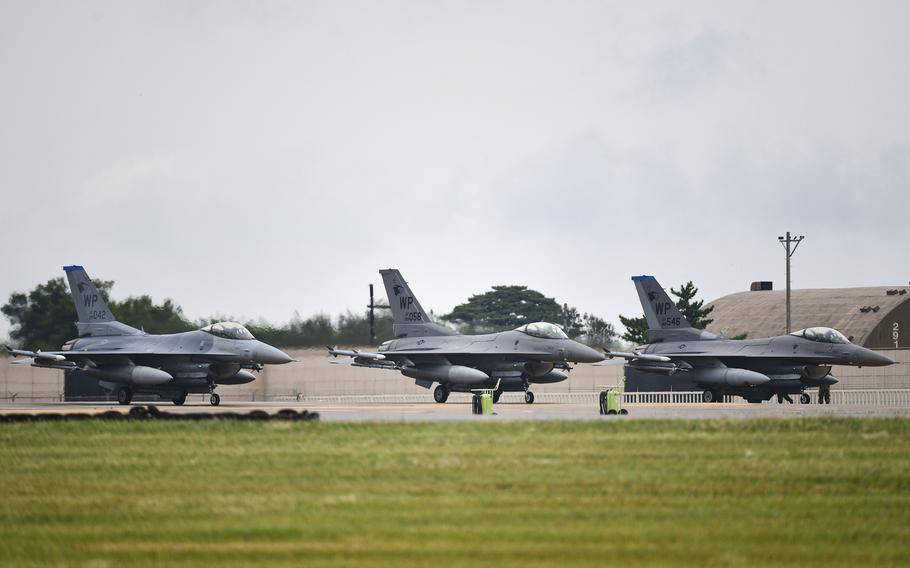
U.S. Air Force F-16 Fighting Falcons of the 35th Fighter Squadron wait for an inspection at Kunsan Air Base, South Korea, Sept. 21, 2021. (Mya Crosby/U.S. Air Force)
CAMP HUMPHREYS, South Korea — The last U.S. Air Force fighter jets from Kunsan Air Base moved this week to Osan Air Base, about 75 miles north, ahead of a scheduled runway overhaul expected to last through the summer.
Around 30 F-16 Fighting Falcons of the 8th Fighter Wing will continue flight operations over South Korea from Osan while their 9,000-foot-long home runway receives a makeover, wing spokeswoman Capt. Kaylin P. Hankerson told Stars and Stripes by email Thursday.
Kunsan is on the country’s west coast about 115 miles south of Seoul and is home to around 4,200 U.S. troops.
Military and commercial flights from Kunsan are suspended starting Saturday through late August when the repairs are expected to be complete, Hankerson said. Roughly 1,500 concrete slabs on the runway are designated for repair or replacement.
The U.S. military routinely makes runway repairs due to wear and tear from aircraft use and exposure to weather. The process involves excavating the existing slabs, pouring new concrete and letting it cure, according to Hankerson.
In 2019, the 8th Fighter Wing suspended flights at Kunsan for one day to repair a 4-foot-deep sinkhole caused by water erosion.
“Ultimately, the construction will ensure the safety of both the military pilots and assets that utilize the runway to project combat air power, as well as the safety of all aboard the Gunsan Airport commercial flights the runway facilitates,” Hankerson said by email.
Gunsan Airport shares a runway with Kunsan and provides flights to Jeju, a small island south of the peninsula.
Despite the runway’s closure, the 8th Fighter Wing’s readiness “will remain unaffected,” Hankerson said.
“As one of the [Air Force’s] most strategic positions in the Pacific, Kunsan will continue to contribute toward the protection of a free and open Indo-Pacific region during the closure,” she said. “Wolf Pack F-16s will continue to fly over the Korean Peninsula and [we] will continue to execute … missions here at home station.”